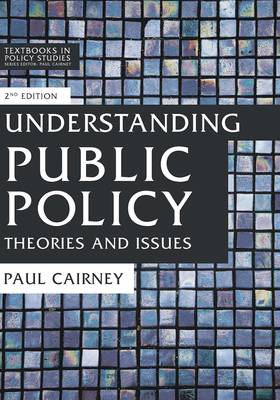
- Retrait gratuit dans votre magasin Club
- 7.000.000 titres dans notre catalogue
- Payer en toute sécurité
- Toujours un magasin près de chez vous
- Retrait gratuit dans votre magasin Club
- 7.000.0000 titres dans notre catalogue
- Payer en toute sécurité
- Toujours un magasin près de chez vous
Description
The fully revised second edition of this textbook offers a comprehensive introduction to theories of public policy and policymaking. The policy process is complex: it contains hundreds of people and organisations from various levels and types of government, from agencies, quasi- and non-governmental organisations, interest groups and the private and voluntary sectors. This book sets out the major concepts and theories that are vital for making sense of the complexity of public policy, and explores how to combine their insights when seeking to explain the policy process. While a wide range of topics are covered - from multi-level governance and punctuated equilibrium theory to 'Multiple Streams' analysis and feminist institutionalism - this engaging text draws out the common themes among the variety of studies considered and tackles three key questions: what is the story of each theory (or multiple theories); what does policy theory tell us about issues like 'evidence based policymaking'; and how 'universal' are policy theories designed in the Global North?
This book is the perfect companion for undergraduate and postgraduate students studying public policy, whether focussed on theory, analysis or the policy process, and it is essential reading for all those on MPP or MPM programmes.
- New sections on power, feminist institutionalism, the institutional analysis and development framework, the narrative policy framework, social construction and policy design
- A consideration of policy studies in relation to the Global South in an updated concluding chapter
- More coverage of policy formulation and tools, the psychology of policymaking and complexity theory
- Engaging discussions of punctuated equilibrium, the advocacy coalition framework and multiple streams analysis
Spécifications
Parties prenantes
- Auteur(s) :
- Editeur:
Contenu
- Nombre de pages :
- 296
- Langue:
- Anglais
- Collection :
- Tome:
- n° 5
Caractéristiques
- EAN:
- 9781137545190
- Date de parution :
- 20-11-19
- Format:
- Livre relié
- Format numérique:
- Genaaid
- Dimensions :
- 178 mm x 246 mm
- Poids :
- 635 g

Les avis
Nous publions uniquement les avis qui respectent les conditions requises. Consultez nos conditions pour les avis.






